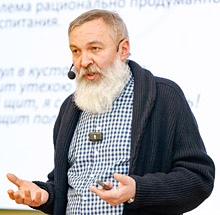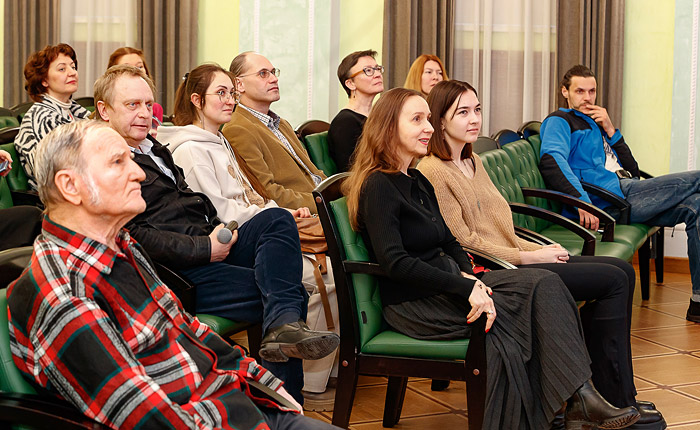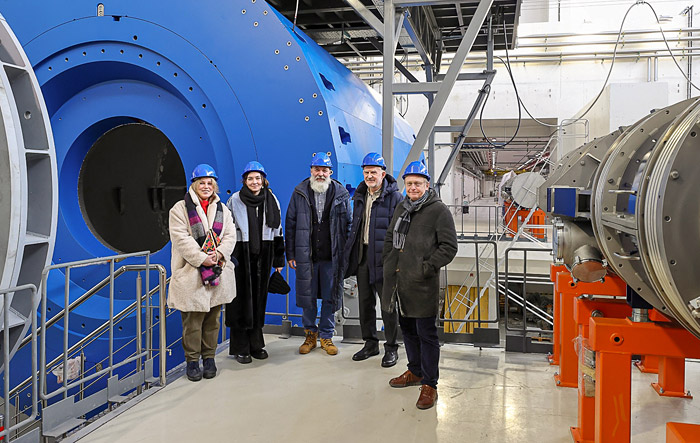
Electronic english version since 2022 |
The newspaper was founded in November 1957
| |
Lecture hall of the JINR Scientists' Club
"Modern science: the social structure of its ideas"
On 8 February, the Day of Russian Science, a lecture hall aimed at strengthening the cooperation between scientists in the natural and humanities fields of science started at the JINR Scientists' Club. The first lectures were given by Professor Vitaly Kurennoy, Director of the Institute for Cultural Research at the National Research University Higher School of Economics.
 He spoke about the social structure of modern science, about attitudes towards science in different historical eras and introduced listeners to famous world ideologists of science - from antiquity to the present day. Part of the professor's stay in Dubna also included a visit to the NICA complex, where he had a unique opportunity to see large physical facilities at the very forefront of modern science.
He spoke about the social structure of modern science, about attitudes towards science in different historical eras and introduced listeners to famous world ideologists of science - from antiquity to the present day. Part of the professor's stay in Dubna also included a visit to the NICA complex, where he had a unique opportunity to see large physical facilities at the very forefront of modern science.
Vitaly Kurennoy is a famous Russian philosopher, cultural scientist, translator and publicist, an expert in the field of techniques of studying modern culture, the history of modern Western philosophy, the institutional history of knowledge, as well as social and political theory. Over the course of three days, 8, 9 and 12 of February, the professor gave a series of lectures "Modern science: the social structure of its idea," in which he presented a historical and systematic analysis of the idea of modern science and the principles of its social structuring. The lecturer skillfully revealed the genealogical meaning of the basic components of this system that had been developed since the era of the classical schools of Ancient Greece and has different national colors in the modern world.

Vitaly Kurennoy noted that science in the way in which we know it, today, is a phenomenon of European culture. It can be considered that the true foundation of classical science was laid in Ancient Greece, when mythological and poetic thinking was first replaced by rationalistic thinking. The development of the institution of knowledge began with the Greek ideal of education - the harmonious development of the individual, for which the state had to create all the conditions. By and large, it is precisely this ideal that underlies science in its modern understanding.
In the Middle Ages, knowledge huddled in monasteries and libraries, until the first university opened in Paris in the 11th century. The theoretical type of attitude to the world that was developed among the Greeks is preserved within the framework of the medieval worldview in the form of complete systems of knowledge that confirm the truths of Revelation by the forces of "natural reason". During this period, the beginnings of many methodological approaches took shape and developed that were harmonized with the medieval religious picture, being inscribed within the framework of theological norms.
During the Renaissance, science leaves the universities and a new figure takes the place of the urban university intellectual - the humanist. This person does not work at the university, he is looking for a patron, a protector, thanks to whom he has the opportunity to engage in science and promote it to the masses. The era of enlightened absolutism is characterized by the fact that the Academy of Sciences becomes the main focus of science and knowledge is estimated from the point of view of its usefulness.
The 19th century was the century when the university flourished and many researchers believe that its classical model originated in Germany, where the basic principles of education that are still relevant today were laid down. It was here that the science of textbooks and encyclopedias turned into a science of original research, a scientist that united scientific and practical activities took up professional scientific activity and focused on one particular field of science. The German university model implies that the student receives education throughout his life and he must learn to learn, must develop competencies and not accumulate knowledge. At the university, science remains dominant: both teacher and student serve it.
The best features of European models of universities and the organization of science and education were borrowed by the Russian Empire and later, by the USSR that became the basis for the development of a unique system of knowledge production here in the 20th century.
The lectures aroused genuine interest among the audience. Vitaly Kurennoy read them fascinatingly, alternating the theoretical part with his own comments and analysis and answers to questions from listeners. Those present took part in a lively dialogue, noting that the topic was chosen in such a way that it reflected current issues in the development of science, culture, society and was closely related to the scientific issues of the Institute.

Vitaly Kurennoy (in the centre) at the NICA accelerator complex
Elena Badawi, Deputy Head of the Department of International Cooperation:
"The opportunity to discuss such topics in a wonderful atmosphere and among like-minded people is the true luxury of the Venetian Doges! And in the hall of the Scientists' Club, it was very cozy and comfortable. I hope this was the beginning of a good tradition. Thank you so much for the initiative and the wonderful lecturer! This is such a level, such speech and depth of thought that listening to the lectures was a true pleasure. It was clear that people did not want to leave. I consider the undertaking absolutely successful! Thank you!"
Lyudmila Kolupaeva, Deputy Head of the Department of Elementary Particle Physics at DLNP:
"I would like to congratulate the Scientists' Club on the launch of a new lecture hall at the intersection of the natural and social sciences. For the first block of lectures, the organizers chose the topic "Modern science: the social structure of its ideas" that was brilliantly covered by Professor Vitaly Kurennoy. In three seminars, the path from the scientists of Ancient Greece to the complex structure of modern science was covered. Despite the generally well-known facts, the lecturer placed interesting accents and gave a very logical explanation of the evolution of the structure of science and its role in society over many centuries. It is worth noting the curiosity of the audience and the multilateral discussion after the lectures. The different life experiences of the listeners made it very non-trivial. I hope that these lectures will mark the beginning of a new glorious tradition."
Alexander Nezvanov, Researcher at the Sector for Research on Fundamental Properties of Neutrons at FLNP:
"I attended my last lectures on philosophy while still at university. I still admire the skill of my teachers to convey seemingly incredibly broad topics in a succinct and accessible language. Therefore, I was very intrigued when I went to the Scientists' Club for a lecture by a professor at the HSE School of Philosophy and Cultural Studies. And my expectations were completely met! Each lecture from the presented series was lively, with interesting explanations and examples. It was as if I had returned to my student days, expanding my knowledge base with historical facts and analysis of the idea of modern science. I'm really looking forward to new lecturers in Dubna, for whom Vitaly Anatolyevich has clearly set a high bar for the quality of lectures!"
The next meeting in the Lecture Hall of the Scientists' Club is scheduled for 29 February, at 4:30 PM.
Konstantin Kurylev, Doctor of Historical Sciences, Professor, Head of the Department of Theory and History of International Relations of the Faculty of Humanities and Social Sciences of the Patrice Lumumba Peoples' Friendship University of Russia, will speak to the audience on the topic "Deevleopment of a new world order: potential scenarios and opportunities".
Ksenia MORUNOVA,
photo by Elena PUZYNINA